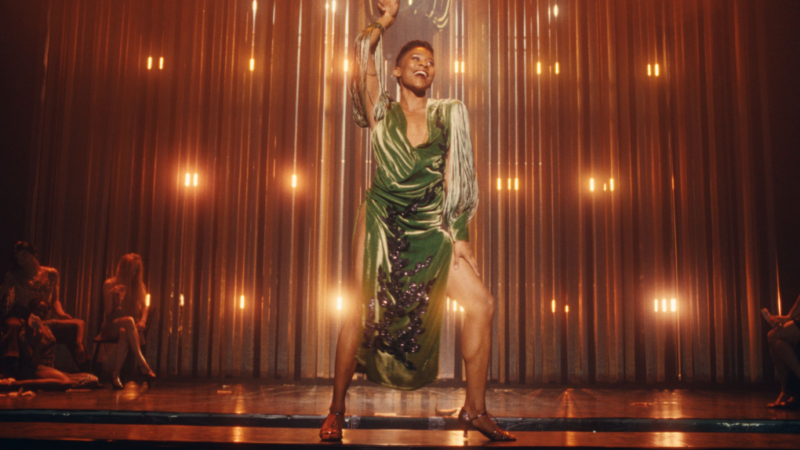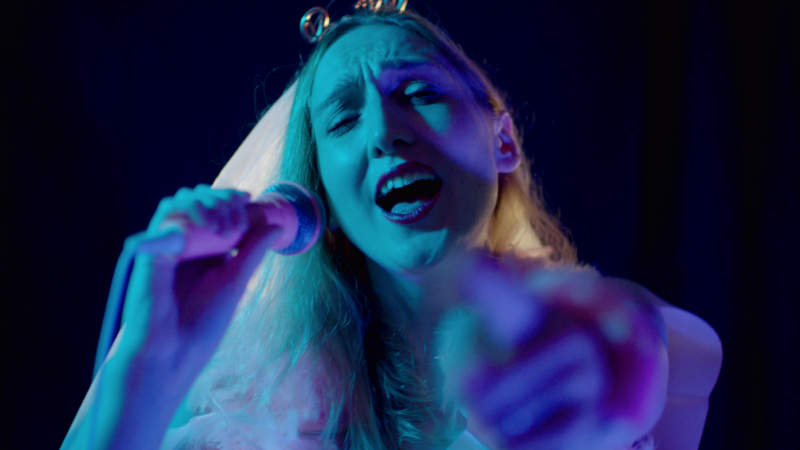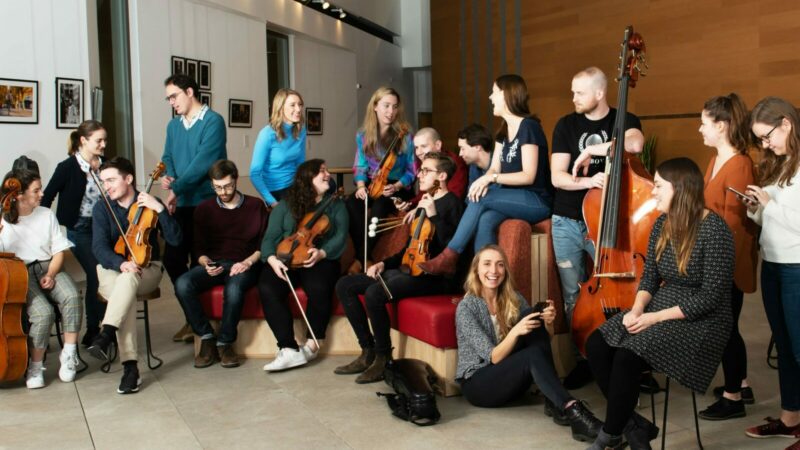Wise Children is a theatre company created and led by Emma Rice, one of the UK’s most distinctive and beloved directors. As well as producing ambitious live performances and international tours, Wise Children have also made pioneering strides into digital spaces. Here, Simon Baker, Wise Children’s Technical Director and Digital Producer, talks us through their last two years of digital experimentation and expansion, and how this has changed the way they reach their audiences now.
The inspiration
The first thing we did when the pandemic happened was a new series of podcasts. Emma could call and talk to all of the people she normally collaborates with, to check in and talk to them on quite a personal level. Because it was the pandemic and we were doing things in a slightly odd way we thought we could play some records and make an hour’s worth of content quite quickly.
At the same time, my son came to live with me. His bedroom was next door to the studio, and I’d hear him howling with laughter and think there must be loads of people round, but he was just watching YouTube. gamers playing Minecraft or Fortnite. I sat with him for ages watching these streamers play games and chat. I thought that if these gamers can get online and their stuff looks high quality and is technically complicated, with graphic overlays and so on, that we must be able to do this.
So that’s when I started learning what you need to get a video camera streamed online, how you put these things together. I bought some bits and suggested to Emma we make a sort of in-camera podcast.
Theatre on the internet?
We made these 30 minute broadcasts live from our place in Somerset and we thought no one would watch it, that it was a good experiment. But we had promoted it online throughout the week and 800 or 900 people watched.
This was proper Heath Robinson stuff, with adaptors into the backs of the computers and still cameras switched onto video mode, guerilla TV, pirate broadcasting style. From there we started to understand how livestreaming would work, what the audience might look like and how you’d promote it.
Because Matthew Warchus at the Old Vic knew we were doing this he sent me a text saying, “Thinking about putting Lungs on the internet… thinking just an iPhone. Will this work?” That conversation broadened out, and led to the In Camera series I did for the Old Vic.
Emma was slightly hesitant to watch, saying “I just don’t see how live theatre can work on TV” but she watched it and loved it and found it very moving, the notion that something was happening in London that she could connect to in our front room in Somerset.
Getting a show online
There are two parts to getting a show online. You’ve got the capture, and that has to get out into the wide world so you need a streaming provider, like Facebook Live or you YouTube. The big hurdle was one I hadn’t planned for. I had concentrated technically and creatively on what we were doing, I hadn’t thought about monetization. You can solve the ticketing aspect, lots of people sell ticketing packages, and you can solve the livestreaming aspect, but I could not work out how to glue those things together. There were not any providers at that time who could do both – but thankfully there now are. TicketCo worked for us. They developed apps so that shows could be watched on TV or a big screen, away from a laptop, and we really encouraged that in our marketing. We wanted the ‘live performance at home’ feel.
Reporting
Initially, the reporting wasn’t good enough for us to have too much information on who was watching on a TV or a laptop or connected device and we only have data on people who bought a ticket rather than who actually watched and we know that families of eight sat round watching Romantics Anonymous.
We learnt that approx. 60% tickets were bought on a mobile phone, so we knew that everything connected to the website needs to be responsive.
Digital tours and partnering with venues
We came up with the idea of a virtual tour which was a marketing exercise in trying to reach a wider audience. Theatres weren’t open and didn’t have anything on at the time, which meant they had very little to communicate to their audience. Romantics popped up at a time when venues were desperate to contact their audiences and we asked them to send in video messages, outlining the fact that they were still there, showing the auditorium etc and we played them during the interval. It was a way of connecting back to those touring venues which we had a relationship with and for the theatres to have something unique to say to their audiences. We were a small team, there was a lot of work involved – including theatres in America – but it was successful and came at the right time in the pandemic.
Commercial aspects
We understand the market a little more now and when we’ve filmed a show, we have a valuable asset. It can generate a livestream income, an on-demand income, there are subscription services etc., a variety of avenues become open. The reality is that we’ve never made money from it, we’ve never lost money, we’ve broken even. Romantics Anonymous allowed us to get better at it, allowed us to take a risk on Flying Lovers, but we haven’t joined a commercial roller coaster, but that’s not to say that you couldn’t. We’re committed to capturing everything we make (rights permitting) and making it available online and if one show happens to be a commercial success, that’s brilliant, but that’s not why we do it.
Reaching and engaging audiences
I thought theatre audiences plan in advance and don’t buy tickets on the night – but I was completely wrong about this! I didn’t know anything! It turns out that people, when they buy stuff online, leave it to the last minute. It’s not for the faint hearted. When you’re looking at cash flow you just think “Wow, this isn’t working” and then suddenly you sell 3,000 tickets in the last hour.
You tend to think that price and location are the factors in why people don’t go to the theatre but we learned that there are so many other reasons. People don’t like to go on their own, for example, or people don’t go because they have childcare issues, or because their work patterns won’t allow it. Everybody’s problem might be niche, but it doesn’t stop them wanting to see the show. Online stuff allows us to open up in a really accessible way to all kinds of people, and that is why we’re now committed to it going forward.
I was moved by the audience reaction. I found them really engaged in a way I hadn’t been prepared for, and was proud to see pictures of people’s laptops in their kitchens or the crazy cables running from a phone to a projector. It was in the same spirit as what we were trying to do. It was a struggle to get on air and I didn’t want it to be a struggle for people to watch, but I liked it when people conquered being able to watch, the spirit of the old days, of trying to get crystal radio sets to work.
I’m also interested in doing some digital-only stuff. When we’re quiet and we don’t have a big show in production, and we’re not out on tour, I think just doing simple, Wise Children style stories straight to camera, would be beautiful and really simple to do, and very nostalgic of the TV that we used to have that isn’t around any more.
How useful was this resource?




